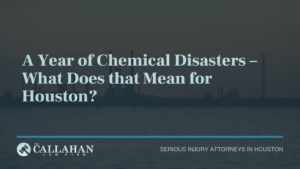A Year of Chemical Disasters – What Does that Mean for Houston?

In the last year or so alone, there have been six major chemical accidents or disasters in the greater Houston area. It started in November, when an explosion occurred at TPC Group plant in Port Neches. Toxic smoke quickly filled the air, immediately nauseating many people nearby as they scrambled to evacuate.
Then in March, thousands of gallons of naphtha, a liquid used to make gasoline, leaked at Deer Park’s Intercontinental Terminals Company. When the naphtha ignited, a fire started. The fire burned for roughly four days which shut down the Ship Channel, and nearby residents were urged to shelter in place as the air filled with highly cancerous benzene.
Just a little over two weeks later, an explosion occurred on April 16th at KMCO in Crosby, injuring thirty-one members of their staff, one of which who died from their injuries. The Exxon Mobile Olefins plant in Baytown exploded one day prior to the ITC explosion, but rather than putting safety measures into place, continued to operate as normal. Another incident then occurred at the Exxon plant a few months later in July, injuring 37 of their workers.
Finally, in January of 2020, an explosion at Watson Grinding and Manufacturing occurred on the northwest side of Houston, killing three people and damaging over 450 buildings in the area surrounding the plant.
Can These Disasters Be Prevented—and How?
These types of major catastrophes, the Houston Chronicle reports, are often preventable. Industrial facilities including these plants are subject to regulations specifically to try to prevent these kinds of incidents. What it ultimately comes down to, however, is the effective enforcement of these regulations. Rules and systems to keep people safe have been put in place; it’s now just a matter of making sure that those measures are taken seriously by workers and executives alike.
The US. Chemical Safety Board discovered after Intercontinental Terminals Company’s explosion that the tank farm lacked an emergency remote shutoff valve, nor did it have alarms that could have alerted workers of the danger at hand.
Like ITC, KMCO had many workplace safety and environmental violations spanning the years prior to their incident that had gone unchecked. The Exxon plant too had the chance to learn from their first explosion that happened in January, which could have helped to prevent their next incident occurring just a few months later.
The Effects of Disaster
These kinds of preventable accidents have led to the deaths and injuries of too many plant workers. In addition, there are some potential effects of these disasters that may not yet be known. Dr. Brett Perkison, a physician who works in Pasadena and Clear Lake, warns that these types of events can aggravate pre-existing conditions, such as asthma. That said, there is no way to tell the long-term effects –such as the development of cancer– that contact to the chemicals caused by these disasters can have on those who were exposed.
In the meantime, however, nearby residents are left to deal with the wake of these disasters. Residents argue that it’s not ethical for the state to blindly trust the corporations who profit off the production of these chemicals to honestly judge and divulge the safety of said chemicals.
One thing that would help these residents is the reduction of air pollution; a 50% decrease of unauthorized releases could create a major positive impact, the Houston Chronicle reports. That said, it appears that neither the industry in general nor the Texas Commission on Environmental Quality is working very hard to do so, nor are they taking the necessary steps to ensure that a lower number of incidents occur.
Research done by The Environmental Integrity Project found that Texas Commission on Environmental Quality had cut its pollution control budget by 35% in the past twelve years, despite the fact that the industry has expanded vastly throughout that time.
John Beard, a resident of Port Arthur and longtime plant-worker, told the Houston Chronicle that the petrochemical plant he worked at “gave employees all the tools they need to be safe;” that said, legal loopholes allowed these plants to postpone these repairs and so they did, deferring larger maintenance issues until they were long-forgotten. This lack of accountability isn’t fair, nearby citizens argue. Instead of teaching their children to shelter in place when these disasters happen, residents implore the state to take measures to prevent these kinds of incidents from happening in the first place.
Our experienced trial lawyers represent injured workers and their families as a result of a wide range of workplace accidents including industrial accidents and explosions. If you or a loved one has been injured in an industrial accident, contact The Callahan Law Firm at 713-224-9000 to request a free, informative case evaluation with a workplace injury attorney today.

Michael S Callahan is an attorney and founder of The Callahan Law Firm. He focuses his practice on representing individuals and families in personal injury cases involving motor vehicle and truck accidents, workplace accidents and defective products. With over 25 years of experience, he is dedicated to fighting on behalf of people whose lives have been forever altered by the negligence and carelessness of corporations and individuals. Originally trained as a mechanical engineer, Michael has been practicing law and fighting for justice for those who need it most since 1994. He is board-certified in Personal Injury Trial Law by the Texas Board of Legal Specialization and a member of various esteemed legal associations. Outside of work, Michael enjoys spending quality time with his family, outdoor activities, and continually striving to improve as a trial lawyer and human being.











